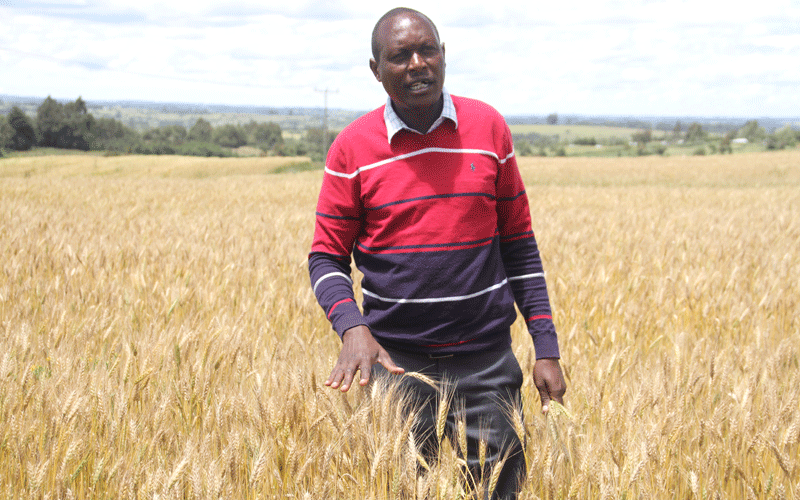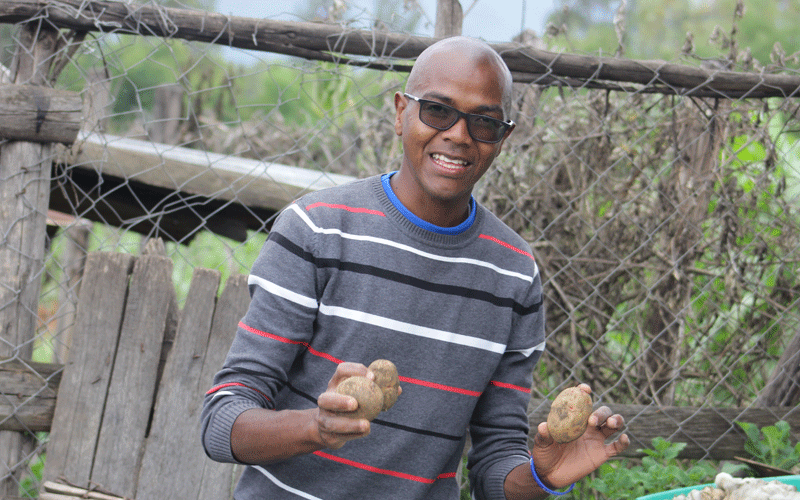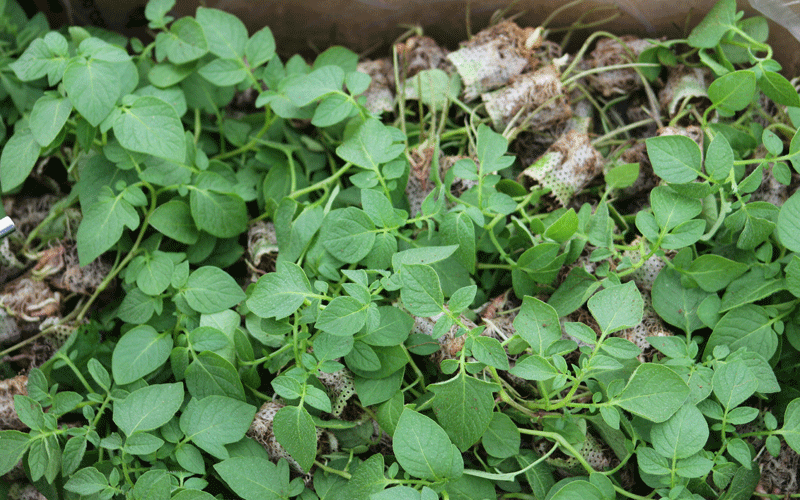Good profits lure investors to potato value chain ventures

Players in the potato value chain business are reaping from propagating, growing and processing the tubers, confirming that there is money to be made in the business.
Better still, the nature of potato farming and processing is such that people from virtually all walks of life, young, old, rich and poor, can participate.
A tour by AgriBiz in Nyandarua and Uasin Gishu counties has revealed how Kenyans of varying ages and economic abilities engage in various aspects of the potato value chain and make profits out of it.
James Nderui, a 29-year old former accountant from Ol Kalou, Nyandarua county, has been producing potato seeds (tubers) from apical cuttings since 2017, earning more than Sh3 million in sales per harvest.
The process involves planting potatoes from seedlings, instead of tubers, with the aim to produce tubers for sale to farmers as potato seeds.
Crop revenues
His journey to become a certified seed producer began by accident in 2015 when he was retrenched by a bank. He used Sh30,000, part of the employee benefit scheme, to grow potato seeds on a quarter of an acre.
Today he produces his potato seeds on a six- acre farm leased from a friend. “I wanted to begin potato seed production, but couldn’t get basic seed even from research institutions.
On asking around, I realised its availability was poor. Despite being a major producer of potatoes in the country, Nyandarua farmers source seeds from Meru and other areas,” he says.
Before he got into potato farming, he first tried growing cabbages on a two-acre farm, which he managed via telephone calls from Nairobi. However, he abandoned the venture after he incurred huge losses.

Potato seed production takes more than a year and involves growing three generations of the crop, beginning with the apical cuttings, which he acquires from a firm in Naivasha.
Nderui sells the third generation of the potatoes, mostly Unica, Zangi and Dutch Robjin varieties, to out growers who sell it to farmers.
“I began with 250 cuttings that cost Sh10 each, which produced two 50kg bags. I re-planted that and got 22 bags weighing 50kgs each.
I still had to plant these yet again on an eight acre parcel of land to produce third generation tubers for sale to farmers,” he says.
A potato seed made from apical cutting produces about 20 to 30 tubers while conventional ones produce about 10 tubers per plant.
“Apical cuttings technology gives you top quality seeds. You only need to do it the right way,” he adds.
Nderui says one hundred apical cuttings ought to give 50kgs of first generation seeds while one acre can take up to 16,000 cuttings.
The certified seeds give a better yield than ordinary ones at 16 tonnes per acre as opposed to the conventional four to six tonnes per acre.
Hence, one acre takes up 16 bags of certified seeds, but yields 160 as opposed to the conventional 60. He then sells each bag at Sh3,000 per bag, making Sh480,000 per acre translating to Sh3.8 million in sales from the eight acres.
When Nderui began, however, he used a spacing of 30-by-30 square feet instead of the recommended 75 by 30 square feet, which left almost no space for earthing up.
Labour is his most expensive cost item, taking up about 65 per cent of his entire cost.
He considers storage his biggest challenge since he has to store his harvest thrice in the course of producing potato seeds for sale. 
Other challenges include finding adequate water, capital and finding appropriate land, preferable virgin land, to carry out the propagation exercise. Another threat is potato seed nematodes and bacteria wilt.
Since Nderui was learning the science and art of producing potato seeds as he grows the crop, he sought help from the Potato Council of Kenya and Kenya Plant Health Inspectorate Services (Kephis), who certify seed producers.
Production costs
Nderui advises people seeking to go into potato seed production to exercise patience. “This job really tests your commitment and your patience.
You must learn to see your shamba (farm) as your office; do not venture into it unless you have a ready market,” he says.
Nderui is not the only one reaping from the potato-value chain. In Engineer town, Nyandarua county, a group of four investors is earning big, selling peeled and packaged potatoes to fast food chains and hotels.
Engineer Food Processing Company buys potatoes, mostly Zangi and Jelly varieties, from local farmers at Sh1,000 for a 50kg bag.
This is a win for both the investors and farmers as the price is way above the Sh400 market price.
“However, the price varies depending on size, maturity, variety and physical appearance, among other factors,” says Danson Ndegwa, the firm’s Production Manager.
After peeling and vacuum-sealing the crop, the factory, which opened in 2019 sells raw chips at about Sh80 per kg, producing over 10 tonnes a month. 
However, the crop loses 20 percent of its weight after peeling, which means 100kg produce 80kg of peeled chips.
In addition, the firm has to pay its 25 employees as well as maintain the equipment including a cold room where potatoes are stored at between 10 and 16 degrees Celsius.
It has binding agreements with farmers to buy their produce, ensuring they have a ready market at agreed prices. “Potatoes can help reduce Kenya’s over-reliance on maize,” says Ndegwa.
Rising demand
Steven Kibor, 45, a large-scale wheat farmer from Kipkabus Uasin Gishu, began growing potatoes in 2018.
He started with five acres, which he later scaled up to 60 acres after realising it was profitable.
From this, he harvested 20 tonnes per acre for sale at Sh800 to Sh3,000 per 90kg bag, depending on market prices.
Kibor spent Sh60,000 on the entire 60 acres, translating to a production cost of Sh1,000 per acre. He plans to increase the acreage under potatoes to 300 acres.
“Demand for potatoes is high as many people are now eating fast foods, giving us a good market. However, the State should ensure potatoes are only sold in kilos,” he says.
The government has been working to protect potato farmers from exploitative packaging, where padded potato bags weigh up to 120kg trade at a retail price of 90kg without considering its normal weight.
Last year, the Agriculture ministry gazetted Irish potato regulations, which limit maximum weight to 50kg bags.



